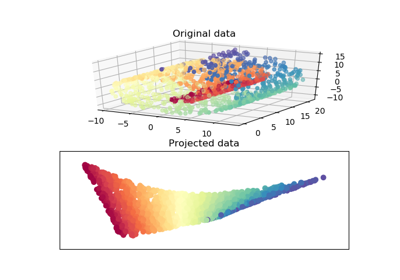sklearn.manifold.locally_linear_embedding¶
-
sklearn.manifold.locally_linear_embedding(X, n_neighbors, n_components, reg=0.001, eigen_solver='auto', tol=1e-06, max_iter=100, method='standard', hessian_tol=0.0001, modified_tol=1e-12, random_state=None, n_jobs=None)[source]¶ Perform a Locally Linear Embedding analysis on the data.
Read more in the User Guide.
- Parameters
- X{array-like, NearestNeighbors}
Sample data, shape = (n_samples, n_features), in the form of a numpy array or a NearestNeighbors object.
- n_neighborsinteger
number of neighbors to consider for each point.
- n_componentsinteger
number of coordinates for the manifold.
- regfloat
regularization constant, multiplies the trace of the local covariance matrix of the distances.
- eigen_solverstring, {‘auto’, ‘arpack’, ‘dense’}
auto : algorithm will attempt to choose the best method for input data
- arpackuse arnoldi iteration in shift-invert mode.
For this method, M may be a dense matrix, sparse matrix, or general linear operator. Warning: ARPACK can be unstable for some problems. It is best to try several random seeds in order to check results.
- denseuse standard dense matrix operations for the eigenvalue
decomposition. For this method, M must be an array or matrix type. This method should be avoided for large problems.
- tolfloat, optional
Tolerance for ‘arpack’ method Not used if eigen_solver==’dense’.
- max_iterinteger
maximum number of iterations for the arpack solver.
- method{‘standard’, ‘hessian’, ‘modified’, ‘ltsa’}
- standarduse the standard locally linear embedding algorithm.
see reference [1]
- hessianuse the Hessian eigenmap method. This method requires
n_neighbors > n_components * (1 + (n_components + 1) / 2. see reference [2]
- modifieduse the modified locally linear embedding algorithm.
see reference [3]
- ltsause local tangent space alignment algorithm
see reference [4]
- hessian_tolfloat, optional
Tolerance for Hessian eigenmapping method. Only used if method == ‘hessian’
- modified_tolfloat, optional
Tolerance for modified LLE method. Only used if method == ‘modified’
- random_stateint, RandomState instance or None, optional (default=None)
If int, random_state is the seed used by the random number generator; If RandomState instance, random_state is the random number generator; If None, the random number generator is the RandomState instance used by
np.random. Used whensolver== ‘arpack’.- n_jobsint or None, optional (default=None)
The number of parallel jobs to run for neighbors search.
Nonemeans 1 unless in ajoblib.parallel_backendcontext.-1means using all processors. See Glossary for more details.
- Returns
- Yarray-like, shape [n_samples, n_components]
Embedding vectors.
- squared_errorfloat
Reconstruction error for the embedding vectors. Equivalent to
norm(Y - W Y, 'fro')**2, where W are the reconstruction weights.
References
- 1
Roweis, S. & Saul, L. Nonlinear dimensionality reduction by locally linear embedding. Science 290:2323 (2000).
- 2
Donoho, D. & Grimes, C. Hessian eigenmaps: Locally linear embedding techniques for high-dimensional data. Proc Natl Acad Sci U S A. 100:5591 (2003).
- 3
Zhang, Z. & Wang, J. MLLE: Modified Locally Linear Embedding Using Multiple Weights. http://citeseerx.ist.psu.edu/viewdoc/summary?doi=10.1.1.70.382
- 4
Zhang, Z. & Zha, H. Principal manifolds and nonlinear dimensionality reduction via tangent space alignment. Journal of Shanghai Univ. 8:406 (2004)

